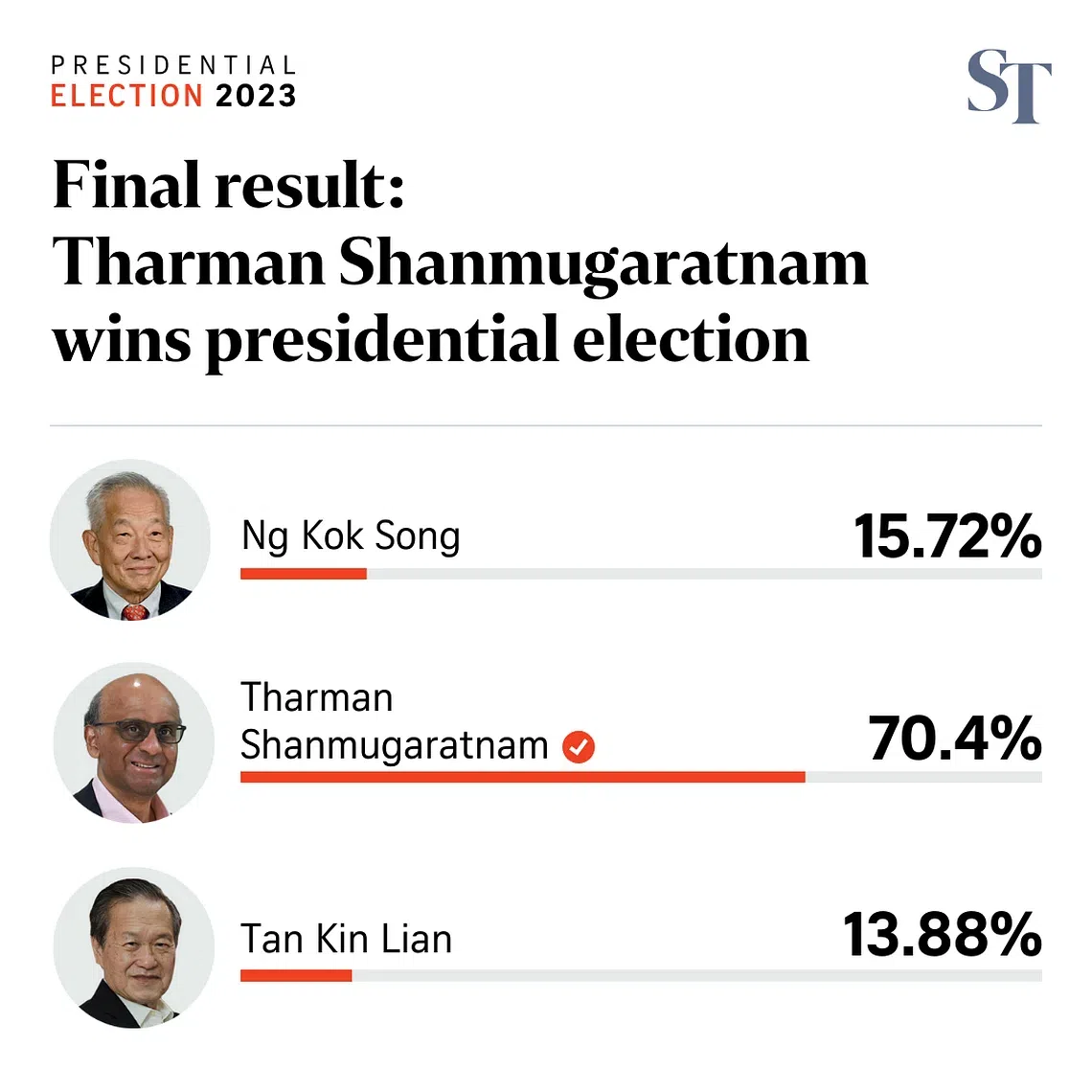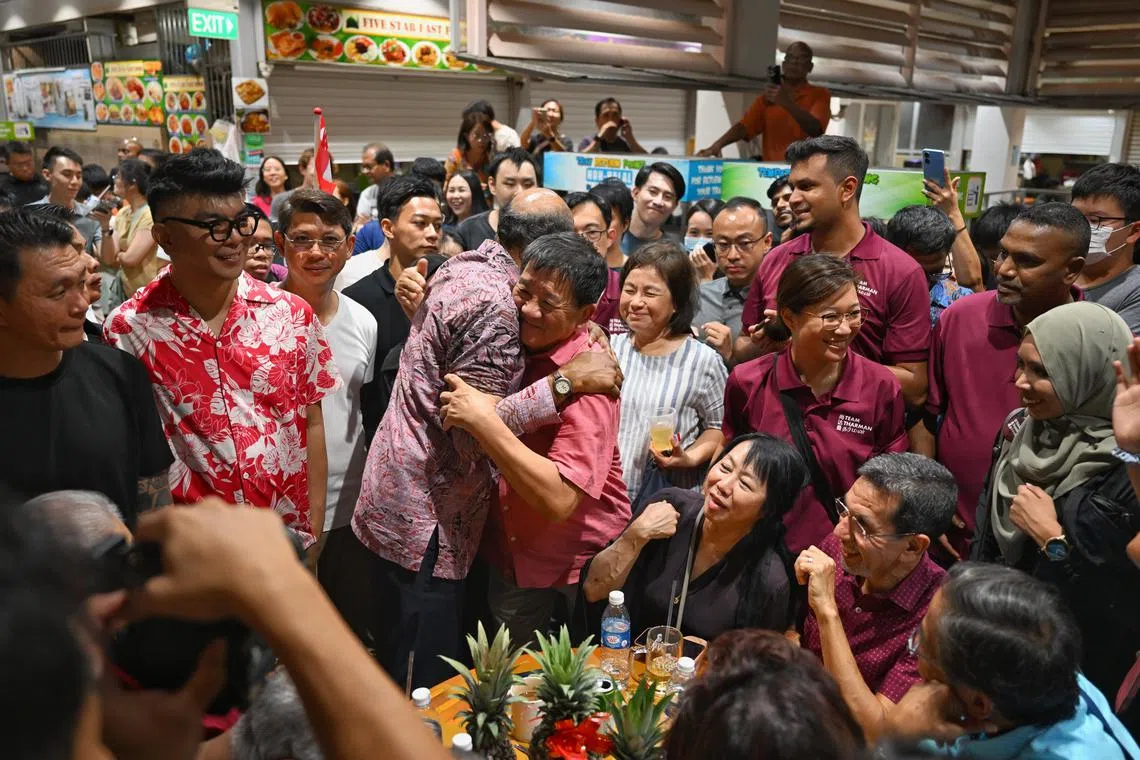Landslide win due to ‘Tharman effect’, voters did not treat election as referendum on PAP: Analysts
Sign up now: Get ST's newsletters delivered to your inbox
Follow topic:
SINGAPORE - President-elect Tharman Shanmugaratnam’s landslide victory
They said the former senior minister’s personal standing and clout among Singaporeans garnered him the lion’s share of the votes and a resounding mandate to be the Republic’s ninth head of state.
In the presidential election on Friday, Mr Tharman, 66, secured 70.4 per cent of the vote while his fellow candidates Ng Kok Song and Tan Kin Lian, both 75, received 15.72 per cent and 13.88 per cent, respectively.
More than 2.5 million Singaporeans went to the polls on Friday
During the hustings, political analysts noted that the endorsements Mr Tan had received from various opposition politicians could lead voters to see the presidential election as a proxy for the next general election.
The margin by which Mr Tharman won was thus surprising and unexpected for some analysts, given recent scandals that plagued the PAP in the last few weeks that they felt could have tainted his candidacy.
Mr Tharman had resigned from the PAP and his posts in Cabinet

Dr Leong Chan-Hoong, head of policy development, evaluation and data analytics at Kantar Public, said he was surprised that Mr Tharman obtained a large share of the votes, given the scandals such as a Corrupt Practices Investigation Bureau probe into Transport Minister S. Iswaran former Speaker of Parliament Tan Chuan-Jin and former Tampines GRC MP Cheng Li Hui.
He also noted that Mr Ng had a credible track record, having been the former chief investment officer of GIC.
The results show voters looked past the issues that plagued the PAP and focused on Mr Tharman’s credentials, Dr Leong said.
“If we look at what happened in the last couple of months… you would expect Mr Tharman’s political background and his affiliation to the ruling party to have been a liability,” he added.
The electorate was mature enough to look beyond that, and consider his personal track record, he said.
Singapore Management University (SMU) associate professor of law Eugene Tan said he would have been surprised if anyone had expected a landslide win for Mr Tharman.
But the results do not suggest that ground sentiments have shifted in favour of the PAP, he added, noting that voters were clear the election was about choosing a president, rather than using it as an opportunity to have a referendum on the ruling party.
“It would be, in my view, a complete misreading of the ground to interpret the results as a signal that the ruling party should go for an early general election,” said Prof Tan.
Assistant Professor Walid Jumblatt Abdullah of Nanyang Technological University’s School of Social Sciences called Mr Tharman’s win a “resounding victory”.
Dr Walid said: “Evidently, the scandals didn’t matter as much. But more broadly, because Tharman was from the PAP and the whole contest was about who was independent, I think the results show that the party brand has not been damaged too much by recent happenings.”
Was independence truly a factor?
Even though the issue of Mr Tharman’s independence was a recurrent sticking point throughout the hustings, it clearly did not hurt him at the ballot box.
Constitutional expert and National University of Singapore (NUS) adjunct law professor Kevin Tan said that in the process of the contest, Mr Tharman had managed to distance himself from being “the epitome of the PAP”.
Dr Chong Ja Ian, associate professor of political science at NUS, noted that Mr Tharman’s 70.4 per cent vote share was not far off from his historical vote share when leading Jurong GRC at previous general elections.
The President-elect rode on his popularity going into the election, and he had two “relatively weak opponents”, said Dr Chong.
He pointed out that few people knew of Mr Ng before the election and while Mr Tan was known to the public, he was called out for making controversial statements about women and race that Dr Chong said were “insulting, to say the least”.
“It does show that Singaporean voters are willing to support the right sort of establishment candidate,” said Dr Chong.

Mr Tharman hugging a supporter shortly before the release of the sample polling result at Taman Jurong Market and Food Centre on Sept 1.
ST PHOTO: SHINTARO TAY
Dr Gillian Koh, senior research fellow at the Institute of Policy Studies (IPS), said Mr Tharman was gracious as a candidate – one who “fought clean, trying to walk the talk of his campaign slogan ‘Respect for All’”.
While Mr Tan must have been “compelling to listen to” as he expressed concern about the daily livelihoods of the people, Dr Koh said most also knew that it would be difficult for him to shape policy by addressing this with the Government, due to the president’s limited role.
In comparison, she said, Mr Tharman spoke of wanting to provide an optimistic future, and building social solidarity
“Everyone matters, and in truth, his track record as a political leader made this credible,” she added.
Dr Mustafa Izzuddin, a senior international affairs analyst at Solaris Strategies Singapore, said Mr Tharman derived his high vote share from “middle-ground voters”.
These voters are a diverse group who tend to vote pragmatically, he added, noting that they also tend to be undecided and “make their decision at the very last minute”.
Dr Mustafa said this group of voters may have felt that the presidential election had become a somewhat polarising contest in the course of campaigning.
Specifically, he pointed to how Mr Tan was endorsed by Dr Tan Cheng Bock,
Mr Tan was also backed by other opposition party members such as Mr Lim Tean, founder of Peoples Voice.
These developments resulted in a positive spillover effect for Mr Tharman, said Dr Mustafa.
He said: “There may have been middle-ground voters who have grievances with the Government, but decided to err on the side of caution. (They) went for someone who they are familiar with, can relate to, and can discharge the role of the president.”
The ‘Tharman effect’
One key factor that analysts said tipped the scales in the President-elect’s favour was the “Tharman effect” – he had his own longstanding credentials built up over his years as an MP and minister, and his relatability factor.
Dr Mustafa said much credit goes to the President-elect himself.
Besides his track record and credentials, Mr Tharman’s personality and graciousness shone throughout the election season, which helped him get a lot of support, Dr Mustafa added.
IPS’ Dr Koh said Mr Tharman is “the total package” due to his international standing, his competence and commitment to the well-being of Singaporeans and Singapore, and his earnestness in campaigning.
NUS’ Dr Chong highlighted that Singaporeans can, and do, vote for minority candidates. “It’s about trust in the candidate,” said Dr Chong. “Of course, minority candidates have to be strong to win support, just like ethnic Chinese candidates. (It’s) just that race may not be a deciding factor.”
SMU’s Prof Tan said that Mr Tharman ran a dignified campaign, which won him even more support.
“We now have our first non-Chinese president elected in a contest with a resounding victory. It speaks of a sophisticated, discerning electorate.”


